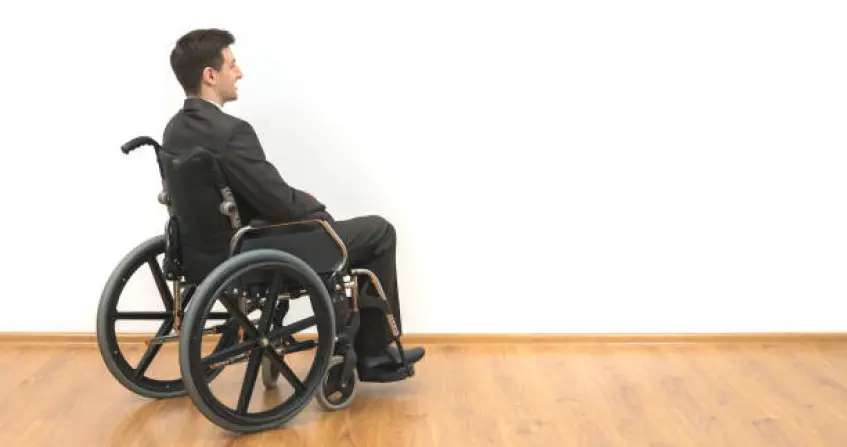There are several reasons for wheelchair use, and some of the reasons aren’t because patients can’t walk.
There are individuals who have lost the ability to use their limbs or lost their limbs and require a wheelchair for movement.
And there are others with invisible illnesses that make moving by themselves extremely painful. Using a wheelchair or any other mobility equipment is a must for such people.
In this article, you will find a list of the most common reasons why different people need a wheelchair.
Table of Contents
- Disabilities that Require a Wheelchair
- 1. Spinal Cord Injuries
- 2. Cerebral Palsy
- 3. Multiple Sclerosis
- 4. Muscular Dystrophy
- 5. Osteoporosis
- 6. Spina Bifida
- 7. Rheumatoid Arthritis
- 8. Parkinson’s Disease
- 9. Amyotrophic Lateral Sclerosis (ALS)
- 10. Scoliosis
- 11. Hemiplegia
- 12. Motor Neurone Diseases
- 13. Oldage
- 14. Amputation
- Other Reasons for Wheelchair Use
- Diseases & Neurological Disorders That Can Put You in a Wheelchair
- Who Needs a Wheelchair?
- When Do You Need a Wheelchair?
- What are Wheelchairs Used for? (Purposes of Wheelchairs)
- Is Being in a Wheelchair a Disability?
Disabilities that Require a Wheelchair

The invention of wheelchairs has been recognized as a great advancement in health technology.
Wheelchairs have made it possible to transport people having walking difficulties from one place to another.
People who use wheelchairs may be suffering from a severe medical condition that affects their ability to walk.
Your doctor will only recommend a wheelchair after a thorough examination of you. Your condition will be examined to determine if you require a wheelchair.
Your doctor will also decide the type of wheelchair that will be suitable for you.
You don’t only need a wheelchair when recovering from a sickness. Certain health conditions that have led to amputation(s) may require you to use a wheelchair until you find an alternative.
A wheelchair will allow you to do your daily activities with little or no difficulties.
Below is a list of wheelchair disability types that also answers the question “why do people need wheelchairs”.
1. Spinal Cord Injuries
Spinal cord injuries lead to different types of impairment.
However, most people with spinal cord injuries require a wheelchair for effective mobility and independence.
For example, quadriplegics (individuals with loss of function of the body below the neck) require a wheelchair and constant assistance.
Although paraplegics (individuals with loss of function in the lower body including the legs) could do more without requiring constant assistance, they also need a wheelchair for movement and other activities.
2. Cerebral Palsy

Cerebral Palsy is several neurological disorders that affect movement and coordination.
Not everyone with cerebral palsy will require a wheelchair. But for those with severe symptoms like limited muscle control and difficulty with coordination and control, mobility devices like wheelchairs are necessary.
Related: How to Choose Disabled Clothing for Wheelchair Users
3. Multiple Sclerosis
Multiple Sclerosis is a disease that affects the brain, spinal cord, and optic nerves.
The disease occurs when the body’s immune system targets its own central nervous system. People with the condition usually have symptoms like stiffness and muscle spasms, walking difficulties, fatigue, seizures, and tremors.
Depending on the severity of the person’s symptoms, they might need to use a wheelchair at all times.
4. Muscular Dystrophy
Muscular dystrophy refers to a group of genetic conditions that cause the muscle to weaken.
People with the condition usually require a wheelchair to move around. Those with severe muscular dystrophy would require wheelchairs with more advanced features for easy mobility and more comfort.
Since the condition refers to a group of inherited genetic conditions, not everyone who has the condition will use a wheelchair the same way.
Also, the severity of the symptoms of the individual will determine their dependence on a wheelchair.
5. Osteoporosis
This is quite similar to muscular dystrophy but instead of the muscles, this condition affects the bones.
Someone with osteoporosis would have extremely brittle bones such that simple movement or a mild fall could cause the bones to fracture.
For people with this condition, using a wheelchair is not a must. However, if the person has severe osteoporosis, they might require a wheelchair to prevent falls and help them move around comfortably.
6. Spina Bifida

Spina Bifida is a birth defect that affects the proper formation of the spine and the spinal cord.
The spinal cord is an important part of the nervous system and it connects the lower body to the brain. People with Spina bifida usually have mobility issues due to the gap in the spine.
For some, early treatment could help correct the condition but complications could also arise and lead to paralysis.
For most people with the condition, movement can only be achieved with a wheelchair.
Related: What You Must Know about Prosthetic Limbs
7. Rheumatoid Arthritis
Rheumatoid Arthritis is an inflammatory disorder that affects the joints of the body mainly those in the hands and the feet.
People with severe arthritis could require a wheelchair to help ease the pain in their joints.
8. Parkinson’s Disease
Parkinson’s disease is a progressive neurological disorder that erodes motor functions and causes difficulties with walking and balance.
The disease first affects the muscles on one side of the body and then progresses to other parts of the body.
People with Parkinson’s disease usually require a wheelchair for easy mobility.
9. Amyotrophic Lateral Sclerosis (ALS)
ALS is a condition that impacts the nerve in the brain and spinal cord, leading to degeneration.
The disease is progressive and over time more motor neurons in the brain die. The affected person eventually loses the ability to control muscle movement across the body and ends up totally paralyzed.
Depending on the severity and progression of the disease, people with ALS would require a wheelchair for easy movement.
There is currently no known cure for the disease and the condition is believed to be inherited in only a few cases.
10. Scoliosis

Scoliosis is a condition characterized by a problematic curvature of the spine.
This condition could develop on its own or as a result of other medical conditions like cerebral palsy or muscular dystrophy.
In many cases, people with scoliosis would not require a wheelchair for movement and can go about their normal lives.
However, some cases are progressive and get more severe as the person grows. This results in the need for a wheelchair for easy mobility.
Related: Best Places Where to Sell Wheelchairs
11. Hemiplegia
Hemiplegia is a medical condition where one side of the body is completely paralyzed.
People with the condition may lose control over the limbs on one side of their body but can move and use the other side easily.
This condition is caused by damage to the brain which could happen before, during, or after birth. Stroke is another likely cause of the condition.
12. Motor Neurone Diseases
Motor Neuron Diseases are a group of neurological disorders that alter the function of the motor neurons.
The motor neurons control voluntary muscle activity like walking, swallowing, and general movement of the body.
Not everyone with this disease will have to use a wheelchair for mobility. Motor Neuron diseases selectively affect motor neurons and cause movement-related symptoms in all affected persons.
Using a wheelchair is a must for people with motor neuron diseases and mobility impairments.
13. Oldage

Growing old is not a disease. It is something we should all experience in our lifetime.
As we grow older, our bodies become weaker as our skeletal muscles weaken (a condition known as sarcopenia).
Sarcopenia is one of the major causes of disability in the elderly and people with the condition would require a wheelchair or other mobility devices for easy movement.
14. Amputation
Amputation is a drastic medical procedure a doctor will carry out on you after exhausting all other options in correcting a health issue on a part of your body.
Parts of the body usually amputated include the hand, arm, foot, leg, toe, and finger.
Accidents are usually the leading cause of amputations.
Your doctor might resolve to cut off the part of your body involved in an accident if it won’t heal or it has been infected. Cancer and malformation of a part of your body can also cause your doctor to carry out an amputation.
However, you have to seek an alternative to living your everyday life when faced with the harsh reality of losing a body part.
A wheelchair might be the best alternative.
Wheelchairs are best suitable if the amputation involves your lower limb, including the thigh, foot, hip, and knee.
Having a wheelchair, either manual or electric, will make movement easier for you.
Other Reasons for Wheelchair Use
Other conditions like cystic fibrosis, Alzheimer’s disease, epilepsy, glaucoma, hypertension, hepatitis C, lymphedema, plagiocephaly, obesity, post-polio syndrome, sleep apnea, and vascular disease could also make people be wheelchair dependent.
Related: Complete Guide on Using Transfer Board from Wheelchair to Toilet
Diseases & Neurological Disorders That Can Put You in a Wheelchair
Some disorders are purely neurological.
Neurological disorders are not easily noticeable from the outward appearance of the patient. These diseases can affect the neurological network of your brain and spinal cord.
The effect of these diseases can be your inability to move some parts of your body.
In some cases, you may experience numbness in the affected part of your body.
Some diseases can also make you use a wheelchair permanently or temporarily for the treatment period.

1. Alzheimer’s Disease
Alzheimer’s disease is a disorder that affects how your brain transmits information through its neurons. It’s caused by the death of brain cells.
The symptoms of Alzheimer’s disease usually start mildly and then progress to more severe symptoms.
Mild symptoms include memory loss, difficulty doing cognitive tasks such as calculating figures, and behavioral change.
As the symptoms progress, you may begin to experience paranoia, have difficulty carrying out simple tasks, and also find it difficult to recognize the faces of close friends and family members.
It may take years for Alzheimer’s disease to develop into a severe stage.
You may have difficulty walking steadily, climbing little heights, and walking on a rough path at this latter stage. You may also find it difficult sitting or rising from the couch.
An easy way of managing your movement will be using a wheelchair.
2. Diabetes
It is caused by an increase in the sugar level of the blood.
This can happen when the insulin in your body, which is responsible for breaking down the sugar in your blood, isn’t enough or your body becomes resistant to it.
A high sugar level in the blood can damage the nerves responsible for controlling the movement of the muscles. It can cause you to lose sensations around your hand and feet.
You will need a wheelchair to be able to move around if you find yourself in this condition.
Related: Complete Guide on Getting a Wheelchair Van Donated to You for Free
3. Vascular Diseases
Vascular diseases are diseases relating to the flow of blood and nutrients through blood vessels.
These diseases can affect your veins, arteries, and lymphatic vessels.
Some of these diseases cause the blood vessels carrying blood to parts of the blood to shrink or get blocked.
The reduced flow of blood to some parts of your body will cause weakness and loss of sensation in those parts of your body. You may have difficulty walking when your legs and knees are affected.
And you may require a wheelchair to aid your mobility throughout the treatment period.
4. Epilepsy

This is easily identified by recurring seizures.
When you begin to experience multiple seizures without any identifiable cause, your doctor may diagnose you as being epileptic.
Seizures occur when the electric rhythm in your brain becomes disrupted, thereby affecting your consciousness and movement.
After having a seizure, it may take between a few minutes to several hours before you recover fully.
In this period, you may experience Todd’s Paralysis, which will make you unable to move all or part of your body for some time. You may have to rely on a wheelchair during this period.
5. Traumatic Brain Injury (TBI)
Traumatic Brain Injury occurs when the brain experiences a violent jolt, which in extreme cases can lead to the tearing and bleeding of tissues in the brain.
Some after-effects of this injury include headache, dizziness, seizures, and unconsciousness.
In extreme cases, TBI can lead to stroke and some degenerative diseases such as Alzheimer’s Disease and Parkinson’s Disease. This will likely cause you to rely on a wheelchair for mobility.
Related: How to Clean Your Wheelchair Like a Pro
Who Needs a Wheelchair?
1. Persons with Disabilities
There are some disabilities capable of making someone immobile. These disabilities include stroke, arthritis, cerebral palsy, and spinal cord injuries.
People living with these disabilities have to rely on mobility aids to do their daily activities.
Wheelchairs are the most common types of mobility aids available for disabled persons.
Different types of wheelchairs include bariatric wheelchairs, pediatric wheelchairs, and motorized wheelchairs. These wheelchairs are designed to accommodate various types of disabilities.
Wheelchairs can also be customized to meet the specific needs of persons with disability.
2. Persons Recovering from Surgeries and Illnesses

Rest is important when recovering from an ailment or injury.
Persons who have just undergone surgical procedures or injury dressings are usually advised to avoid putting pressure on the stitched part of their bodies.
Undue pressures on these areas may prolong the healing process.
Also, doctors may advise their patients to embark on partial bedrest when undergoing treatments for specific ailments. This is to allow their bodies to heal faster.
A patient faced with any of these circumstances will need a wheelchair to move about during such a period.
3. Persons with Chronic Pain and Acute Fatigue
You may have to deal with pains in various parts of your body at some point in your life.
When this pain becomes severe and affects your ability to move about, you may have to depend on a mobility aid.
It could also be that you suffer from acute fatigue. Symptoms of acute fatigue include persistent tiredness, dizziness, weak muscles, aching muscles, and joint pain.
You may have to use a wheelchair to conserve your strength.
A wheelchair can also make you move about more smartly, thereby making you more productive at your workplace.
Related: Complete Guide on Getting a Wheelchair Bound Person into a Car
When Do You Need a Wheelchair?

1. Discomfort Using Crutches
In a bid to save cost or avoid the bulkiness of a wheelchair, you might have opted to use crutches as your mobility aid.
Your doctor might have also recommended using crutches to support yourself since you’re dealing with a lower limb injury.
However, you may begin to experience some side effects of using crutches for an extended period.
The side effects include underarm bruise, back pain, and shoulder pain. You may have to use a wheelchair when these side effects become unbearable.
It’s important you first consult your doctor to discuss your desire to use a wheelchair.
2. Diagnosis of Permanent Disability
Some disabilities may start as a minor ailment or injury. The mild stage of the ailment might not require you to depend on a mobility aid for movement.
At most, you may have to walk slowly or use walkers to aid your movement.
A minor ailment can progress to a more severe one if you don’t receive adequate medical attention on time. This ailment might badly affect your muscles and joints, leaving you with a permanent disability.
You will need a wheelchair when you’ve been diagnosed with a permanent disability if you must continue to move about with ease.
3. Weakness Due to Old Age
Your agility will begin to reduce as you approach old age.
This is natural, and you can only focus on maintaining your health in order to enjoy your old age.
This period of your life will require you to observe a strict diet and have enough rest. You may also need a wheelchair to aid your mobility if you will easily get fatigued from walking.
There is no specific age when it’s perfect to consider using a wheelchair.
Go for regular medical checkups so that your doctor can assess you and give you proper guidance.
4. Recurring Health Condition
You may be suffering from a health challenge that usually leaves you temporarily immobile whenever you have a relapse.
Such health challenges could be epilepsy, acute fatigue, or severe leg pain. Sometimes, you may find it difficult to get support when such a health problem reoccurs.
Having a wheelchair will reduce the troubles you will go through when you’re faced with an unexpected episode of your health challenge.
You will also be at ease going for outdoor activities, knowing that you won’t subject yourself to much physical stress. And if you happen to have a relapse, you can easily wheel yourself home.
Related: How to Wash Someone’s Hair in a Wheelchair Like a Pro
What are Wheelchairs Used for? (Purposes of Wheelchairs)

1. Mobility
The primary reason for inventing wheelchairs is to allow immobile patients to move about with little or no support.
Healthcare providers find this device useful, especially at the hospital where you will be required to move between various hospital sections.
You will also need wheelchairs in your home to enable you to navigate through different areas of your home with little or no assistance.
With a wheelchair, you’ll be able to visit the grocery store, park, and do other outdoor activities.
2. Independence
Having a disability can come with the need for a caregiver, especially when you haven’t yet learned to live with the disability.
You may, however, not be opportune to always have a caregiver by your side to attend to all your needs. A wheelchair can give you a high level of independence.
You can use the restroom, do your laundry, clean your home, and prepare your meal using a wheelchair, provided your disability will allow you to perform such activities.
Most wheelchairs come with detachable handles and other adjustable features that will enable you to perform various tasks while sitting in the wheelchair.
3. Sports
The uses of wheelchairs have continued to undergo modifications.
Disabled persons can now use wheelchairs to engage in sporting activities. Sports wheelchairs are slightly modified to suit as many sporting activities as possible.
Some of the sports that can be done using a wheelchair include table tennis, badminton, racing, hockey, baseball, and football.
You, however, need to consult your doctor before engaging in wheelchair sports. Your doctor will decide the type of sports wheelchair your disability will permit you to use.
Is Being in a Wheelchair a Disability?
Using a wheelchair isn’t a disability. Wheelchairs allow you to carry out any other activities a non-wheelchair user will do. Manufacturers are also introducing many smart features into wheelchairs so that users can use the wheelchairs comfortably irrespective of the type of their disabilities.
Being in a wheelchair doesn’t deprive you of your civil rights and privileges.
You’re free to engage in any legal activity and participate in any authorized gathering.
But you must follow your doctor’s advice to avoid endangering your health.
Check Out Related Articles
- How to Use a Walking Frame Correctly
- Complete Guide on Choosing Disabled Clothing for Wheelchair Users
- What are Prosthetic Limbs Made of? (Answered)
- How to Get a Wheelchair Bound Person into a Car
- Best One-Handed Stores
- List of Where to Sell Wheelchairs
- How to Wash Someone’s Hair in a Wheelchair
- How Fat Do You Have to be to Get Disability? (Answered)
- How to Use Transfer Board from Wheelchair to Toilet
- How to Clean & Disinfect Your Wheelchair Like a Pro
- How to Get a Wheelchair Van Donated to You for Free





hi thanks for the article:
there are a couple things that irk me, as a wheelchair using person with hemiplegia I need to point out that you either use the wrong term or the wrong discripition, people who can’t use their limbs have a parese plegic means limitation of use, often spastic.
And it annoys me a lot that you use a temporary use fold up chair as photo for wheelchair this confirms to walkers how horrible it is to have to use a wheelchair,
just pick a photo of an “active” wheelchair, because that is the type you get when it is permanent
And it would be nice if you had numbers, I once heard 75% of wheelchair users can walk (short distances)
It’s nice that you pointed out how a wheelchair will allow you to do your daily activities with little or no difficulties. My friend got injured recently and it seems he is having some difficulties moving around right now. Thankfully there are wheelchairs readily available nowadays, so he should probably try stopping by a mobility shop later.